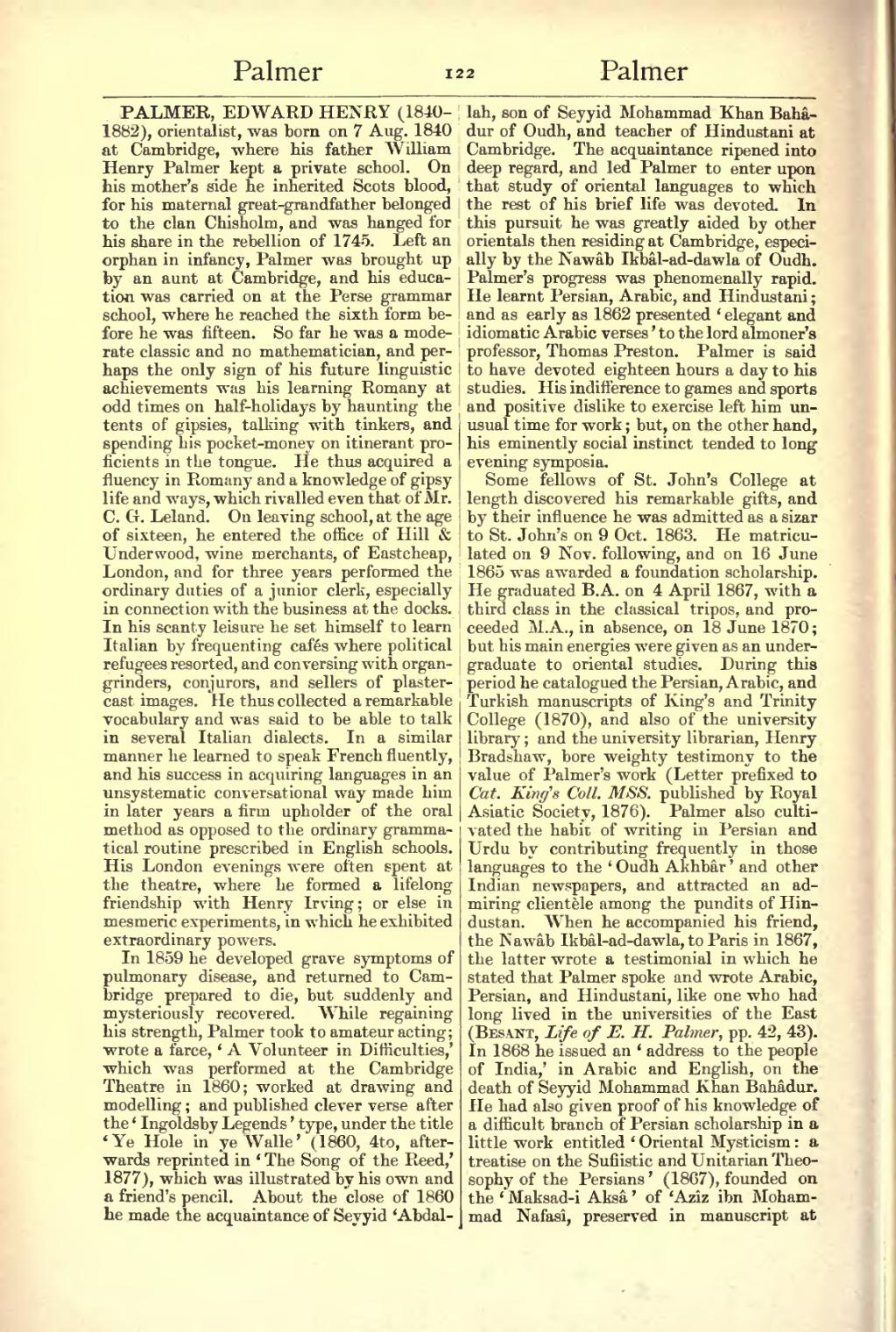PALMER, EDWARD HENRY (1840–1882), orientalist, was born on 7 Aug. 1840 at Cambridge, where his father William Henry Palmer kept a private school. On his mother's side he inherited Scots blood, for his maternal great-grandfather belonged to the clan Chisholm, and was hanged for his share in the rebellion of 1745. Left an orphan in infancy, Palmer was brought up by an aunt at Cambridge, and his education was carried on at the Perse grammar school, where he reached the sixth form before he was fifteen. So far he was a moderate classic and no mathematician, and perhaps the only sign of his future linguistic achievements was his learning Romany at odd times on half-holidays by haunting the tents of gipsies, talking with tinkers, and spending his pocket-money on itinerant proficients in the tongue. He thus acquired a fluency in Romany and a knowledge of gipsy life and ways, which rivalled even that of Mr. C. G. Leland. On leaving school, at the age of sixteen, he entered the office of Hill & Underwood, wine merchants, of Eastcheap, London, and for three years performed the ordinary duties of a junior clerk, especially in connection with the business at the docks. In his scanty leisure he set himself to learn Italian by frequenting cafés where political refugees resorted, and conversing with organ-grinders, conjurors, and sellers of plaster-cast images. He thus collected a remarkable vocabulary and was said to be able to talk in several Italian dialects. In a similar manner he learned to speak French fluently, and his success in acquiring languages in an unsystematic conversational way made him in later years a firm upholder of the oral method as opposed to the ordinary grammatical routine prescribed in English schools. His London evenings were often spent at the theatre, where he formed a lifelong friendship with Henry Irving; or else in mesmeric experiments, in which he exhibited extraordinary powers.
In 1859 he developed grave symptoms of pulmonary disease, and returned to Cambridge prepared to die, but suddenly and mysteriously recovered. While regaining his strength, Palmer took to amateur acting; wrote a farce, ‘A Volunteer in Difficulties,’ which was performed at the Cambridge Theatre in 1860; worked at drawing and modelling; and published clever verse after the ‘Ingoldsby Legends’ type, under the title ‘Ye Hole in ye Walle’ (1860, 4to, afterwards reprinted in ‘The Song of the Reed,’ 1877), which was illustrated by his own and a friend's pencil. About the close of 1860 he made the acquaintance of Seyyid ‘Abdallah, son of Seyyid Mohammad Khan Bahâdur of Oudh, and teacher of Hindustani at Cambridge. The acquaintance ripened into deep regard, and led Palmer to enter upon that study of oriental languages to which the rest of his brief life was devoted. In this pursuit he was greatly aided by other orientals then residing at Cambridge, especially by the Nawâb Ikbâl-ad-dawla of Oudh. Palmer's progress was phenomenally rapid. He learnt Persian, Arabic, and Hindustani; and as early as 1862 presented ‘elegant and idiomatic Arabic verses’ to the lord almoner's professor, Thomas Preston. Palmer is said to have devoted eighteen hours a day to his studies. His indifference to games and sports and positive dislike to exercise left him unusual time for work; but, on the other hand, his eminently social instinct tended to long evening symposia.
Some fellows of St. John's College at length discovered his remarkable gifts, and by their influence he was admitted as a sizar to St. John's on 9 Oct. 1863. He matriculated on 9 Nov. following, and on 16 June 1865 was awarded a foundation scholarship. He graduated B.A. on 4 April 1867, with a third class in the classical tripos, and proceeded M.A., in absence, on 18 June 1870; but his main energies were given as an undergraduate to oriental studies. During this period he catalogued the Persian, Arabic, and Turkish manuscripts of King's and Trinity College (1870), and also of the university library; and the university librarian, Henry Bradshaw, bore weighty testimony to the value of Palmer's work (Letter prefixed to Cat. King's Coll. MSS. published by Royal Asiatic Society, 1876). Palmer also cultivated the habit of writing in Persian and Urdu by contributing frequently in those languages to the ‘Oudh Akhbâr’ and other Indian newspapers, and attracted an admiring clientèle among the pundits of Hindustan. When he accompanied his friend, the Nawâb Ikbâl-ad-dawla, to Paris in 1867, the latter wrote a testimonial in which he stated that Palmer spoke and wrote Arabic, Persian, and Hindustani, like one who had long lived in the universities of the East (Besant, Life of E. H. Palmer, pp. 42, 43). In 1868 he issued an ‘address to the people of India,’ in Arabic and English, on the death of Seyyid Mohammad Khan Bahâdur. He had also given proof of his knowledge of a difficult branch of Persian scholarship in a little work entitled ‘Oriental Mysticism: a treatise on the Sufiistic and Unitarian Theosophy of the Persians’ (1867), founded on the ‘Maksad-i Aksâ’ of ‘Azîz ibn Mohammad Nafasî, preserved in manuscript at
